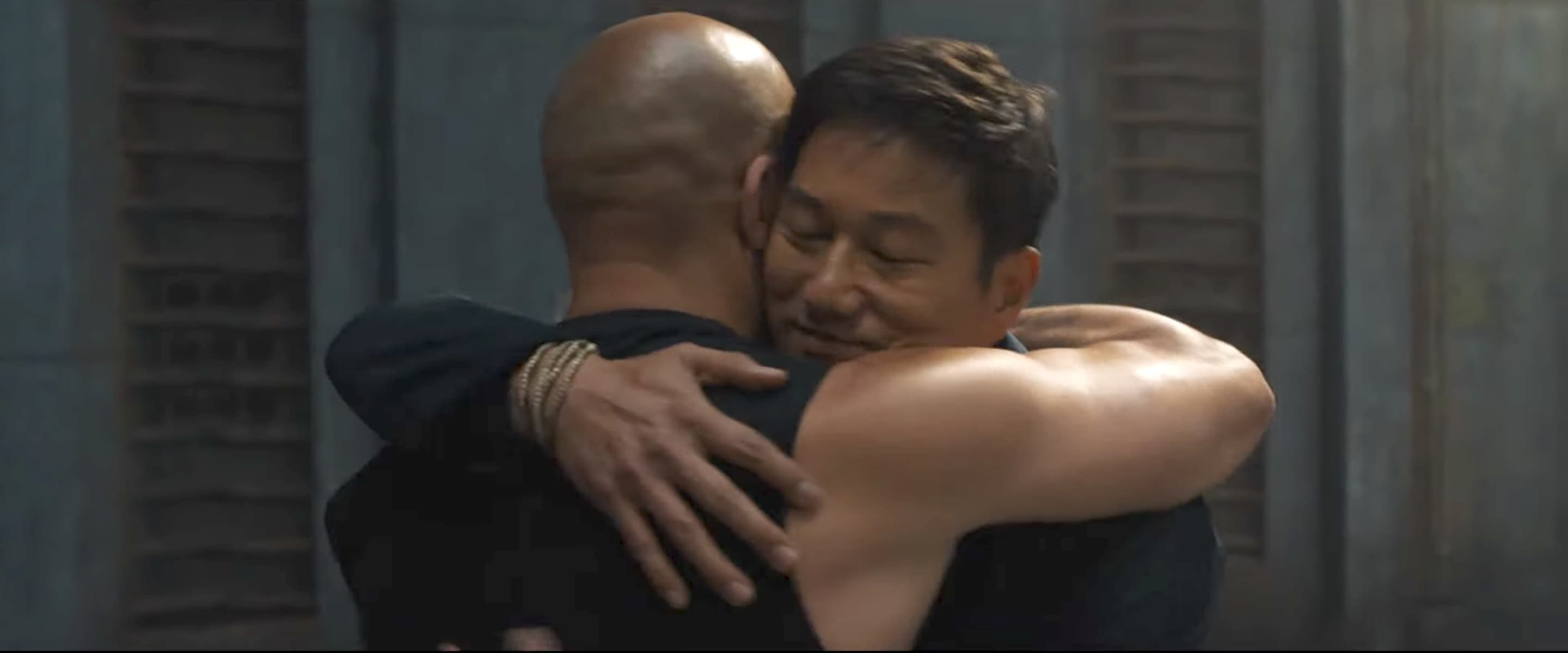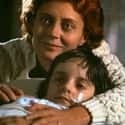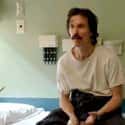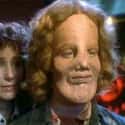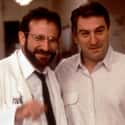-
(#1) Moulin Rouge!
- Nicole Kidman, Ozzy Osbourne, Kylie Minogue, Ewan McGregor, Jim Broadbent, John Leguizamo, David Wenham, Richard Roxburgh, Deobia Oparei, Caroline O'Connor, Natalie Mendoza, Kerry Walker, Garry McDonald, Jacek Koman, Linal Haft, Matthew Whittet
Moulin Rouge! (2001), starring Nicole Kidman and Ewan McGregor, is a musical film depicting a love affair between a poet and a singer at Paris’s Moulin Rouge theater.
Illness: Tuberculosis (AKA TB or consumption)
How it is portrayed: In the early 19th century, during a time in which Paris's Moulin Rouge theater was at the height of its popularity, the spread of tuberculosis was particularly prevalent. As a disease that thrives in highly populated areas lacking access to adequate hygiene, it can be transmitted easily to other people - and through something as simple as a sneeze. The disease targets various parts of the body, but primarily the lungs, causing bleeding. The cough that Kidman's character develops over the course of the movie is an accurate portrayal of the symptoms; that McGregor's character is asymptomatic accurately reflects the fact that the disease did not always cause symptoms or loss of life for those who contracted it. It was a matter of individual immunities.
-
(#2) The Favourite
- Olivia Colman, Emma Stone, Rachel Weisz, Nicholas Hoult, Joe Alwyn, Mark Gatiss
The Favourite (2018), starring Olivia Colman and Emma Stone, is a story set in 18th-century England in which two women compete for the favor of Queen Anne.
Illness: Gout
How it is portrayed: Gout, also referred to as "the disease of kings," is an arthritis-like inflammatory disease that impairs the joints caused by consuming foods high in fat. A poor diet and obesity can lead to the buildup of uric acid in the body, resulting in excruciating pain in the limbs. As portrayed in the movie, the queen was known to have suffered from this disease for much of her life, in addition to other ailments. Both the symptoms of the disease and its appearance on Anne's body in the film appear to be accurate, as were the treatments used, including the herbs gathered by Stone’s character in an effort to ease the queen's pain.
-
(#3) Kingdom of Heaven
- Eva Green, Liam Neeson, Edward Norton, Orlando Bloom, Jeremy Irons, Michael Sheen, Brendan Gleeson, Nikolaj Coster-Waldau, Kevin McKidd, Iain Glen, David Thewlis, Marton Csokas, Alexander Siddig, Ulrich Thomsen, Jon Finch, Bill Paterson, Philip Glenister, Nathalie Cox, Khaled El Nabawy, Robert Pugh, Bronson Webb, Eriq Ebouaney, Peter Copley, Martin Hancock, Tim Barlow, Christian Boeving, Steven Robertson, Alex O'Dogherty, Michael FitzGerald, Jouko Ahola, Velibor Topić, Angus Wright, Giannina Facio, Karim Saleh, Nasser Memarzia, Paul Brightwell, Shane Attwooll, Ghassan Massoud, Alfonso Sánchez, Matthew Rutherford, Lotfi Yahya Jedidi, Emilio Doorgasingh, Alex Revan, Michael Shaeffer, Peter Cant
Kingdom of Heaven (2005) is a film set in 12th-century Europe at the time of the Crusades. The story follows a young man played by Orlando Bloom as he follows his father to Jerusalem, where he eventually fights alongside King Baldwin IV, AKA The Leper King.
Illness: Leprosy
How it is portrayed: Despite the film's slight misrepresentations of certain contending relationships between the characters, it maintains a historically correct account of Baldwin's struggle with leprosy and rise to power despite his condition. Typically, those diagnosed with leprosy would have been socially isolated, but because of Baldwin's royal standing, he was allowed to continue living among the people of the city. One of the more glaring inaccuracies in regard to his condition, though, is his wearing of a mask whenever in public, as there appears to be no record of Baldwin ever having done this.
-
(#4) My Left Foot
- Daniel Day-Lewis, Fiona Shaw, Brenda Fricker, Cyril Cusack, Ray McAnally, Kirsten Sheridan, Adrian Dunbar, Hugh O'Conor, Tom Hickey, Britta Smith, Ruth McCabe, Jer O'Leary, Eileen Colgan, Derry Power, Naomi Sheridan, Pat Laffan, Martin Dunne, Phelim Drew, Eanna MacLiam, Julie Hale, Darren McHugh, Owen Sharpe, Declan Croghan, Marie Conmee, Tess Sheridan, Alison Whelan, Conor Lambert, Deborah Pierce, Jean Doyle, Barry Lord, Lisa Jane Rowland, Lucy Vigne Welsh, Simon Kelly, Patricia Higgins, Dean Clifford, Colm Rowland, Charlie Roberts, Emily Hodge Barker, Eoghan O'Sullivan, Margaret Lyons, Owen Sullivan, Sean Rowland, Eileen Kohlmann, Wayne Kearney, Barry Keane, Lesley Ann Long, Jacinta Whyte, Mil Fleming, Denis O'Leary, John Mark Knight, Audrey Diffley, Daniel Reardon, Cathy Corcoran, Oba Seagrave, Hilery O'Donovan, Rita Lowe, Albert Kavanagh, Joe Swan, Dawn Kursinczy, Gerard Hourigan, Jenny Bryne, Linda Walker, Caromy Corcoran, Sarah Cronin, Keith O'Conor, Kerry Ellen Lawlor, Fiacra Sheridan, Aisling Murnane, Don King
My Left Foot (1989) is based on the life of Irish artist and writer Christy Brown, who was born in 1932 with cerebral palsy, resulting in an inability to use all but one of his limbs: his left foot.
Illness: Cerebral palsy
How it is portrayed: The film does a good job portraying the physical and social limitations experienced by those with physical disabilities during the 1940s and 1950s, particularly in Dublin. The film also accurately reflects the experience specific to Brown and his family, notably the discovery of his ability to use his left foot to communicate. It also shows how physical and occupational therapy can be used to help individuals with cerebral palsy successfully develop their motor and speech skills.
-
(#5) Little Women
- Saoirse Ronan, Laura Dern, Emma Watson, Florence Pugh, Eliza Scanlen, Timothée Chalamet, James Norton, Louis Garrel, Meryl Streep
Greta Gerwig's Little Women (2019) is based on Louisa May Alcott's oft-adapted 1868 novel of the same name. The film tells the story of four sisters living in Massachusetts during the American Civil War era.
Illness: Scarlet fever
How it is portrayed: In the film, one of the four sisters, Beth, contracts scarlet fever when coming to the aid of a neighboring family whose child had the disease. The disease is highly contagious and results in a high fever accompanied by a skin rash and severe sore throat. Thanks to the quick care administered by her sisters, Beth recovers from her illness, but her immune system is jeopardized. As is often the case for those who manage to recover from scarlet fever, Beth's weakened immune system leaves her susceptible to other complications, which leads inexorably to her passing. Though scarlet fever is now treatable, at the time the film takes place, the mortality rate was particularly high.
-
(#6) The Elephant Man
- Anthony Hopkins, John Hurt, Anne Bancroft, John Gielgud, Wendy Hiller, Kenny Baker, Freddie Jones, Michael Elphick, Patricia Hodge, Kathleen Byron, Lesley Dunlop, Dexter Fletcher, William Morgan Sheppard, Harry Fielder, Phoebe Nicholls, John Standing, David Ryall, Hannah Gordon, Pauline Quirke, Claire Davenport, Nula Conwell, Carol Harrison, Helen Ryan, Ralph Morse, Frederick Treves, Hugh Manning, Patsy Smart, Roy Evans, Deirdre Costello, Fanny Carby, Marcus Powell, Eiji Kusuhara, Norman Gay, Pat Gorman, Gerald Case, Hugh Spight, Tommy Wright, Eric Bergren, Tony London, Christopher Greener, Robert Lewis Bush, Brenda Kempner, Richard Hunter, Janie Kells, Peter Davidson, Teresa Codling, Dennis Burgess, Christopher De Vore, Bernadette Milnes, Joan Rhodes, Alfie Curtis, Adam Caine, Gilda Cohen, Stromboli, Victor Kravchenko, James Cormack, Kevin Schumm, Beryl Hicks, Penny Wright, Marion Betzold, Robert Day, Caroline Haigh, Florenzio Morgado, Michele Amas, Fred Wood, Orla Pederson, Lesley Scoble, Teri Scoble, Lydia Lisle, John Rapley, Lucie Alford
The Elephant Man (1980) is based on the true story of Joseph Merrick, a man who lived in London during the late 1800s and suffered from a physical deformity believed to have been undiagnosed Proteus syndrome.
Illness: Severe deformity, possibly Proteus syndrome
How it is portrayed: The deformity suffered by Merrick during his life appears to be correctly portrayed throughout the film, as his ailment resulted in his being forced into a life as a sideshow attraction. The film shows him sleeping sitting in a chair with his head resting on his knees, which is believed to have been necessary for Merrick so that the weight and size of his head wouldn't asphyxiate him. Additionally, his passing in the film is consistent with Merrick's presumed cause of death - spinal dislocation and/or asphyxiation.
-
(#7) Lorenzo's Oil
- Susan Sarandon, Nick Nolte, Laura Linney, Peter Ustinov, E.G. Daily, Margo Martindale, James Rebhorn, Mary Pat Gleason, James Merrill, Becky Ann Baker, Ann Dowd, Kathleen Wilhoite, Gerry Bamman, David Shiner, Keith Reddin, Rocco Sisto, Sandy Gore, Michael O'Neill, Peter MacKenzie, LaTanya Richardson, Angus Barnett, Paul Lazar, Aaron Jackson, Amelia Campbell, Ayub K. Ommaya, Jennifer Dundas, David McFadden, William Cameron, Ann Hearn, Maduka Steady, Mary Schmidt Campbell, Ann McDonough, Joyce Reehling, Justin Isfeld, William Thunhurst Jr., Vladimir Padunov, Richard Cordery, Lamont Arnold, Nora Dunfee, Zack O'Malley Greenburg, Anthony Dileo Jr., Lisa Montgomery, Ryan Thomas, Helena Ruoti, Kathryn Aronson, Eric Kunkle, Daniel W. D'Arcy, Jeremy Beyer, Matthew Pyeritz, Christine Merriman, Mack Hegyes, Don Suddaby, Lamar Olivis, Raina Clifford, Nicholas Wiese, Todd Bella, C. Alex Roberts, Tia Delaney, Connie Cranden, Keiko I McDonald, Ryonosuke Shiono, John Mowod, Lianne Kressin, Carmen Piccini, Brad Einhorn, Susan Chapek, Luis Ruiz, Zahra Ilkanipour, Barbara Poitier, Charles R. Altman, Michael Haider, Rachel Jones, Annie Loeffler, David Doepken, Berta Van Zuiden, Mary Wakio, April Merscher, Eliot Brinton, Kiran Rao, Noah Banks, Billy Amman, Nancy Chesney, Shirley Tannenbaum, Nicolas Petrov, Cristin Woodworth, Colin Ward, Neri Kyle Tannenbaum, Marie Nugent-Head, Nora Gerard, Julie Marie Remele
Lorenzo’s Oil is a 1992 film based on the life of Lorenzo Odone and his parents' years-long journey to finding a cure for his adrenoleukodystrophy (ALD) diagnosis in spite of criticism from friends and professionals alike.
Illness: Adrenoleukodystrophy (ALD)
How it is portrayed: ALD is a genetic disease that results in the buildup of fatty acids in the brain, which then coats and wipes out the coating of the brain's nerve cells, making it progressively more difficult to control muscles and motor functions. While the film's focus on the journey taken by the Odone family in their search for a cure is true to the events as they transpired during the decline of Lorenzo’s health, the film received some criticism in how it portrays the discovery of the cure itself. Many members of the medical community felt that the film "paint[ed] a picture of a miracle cure," which is not reflective of how the oil actually works in patients suffering from this disease.
-
(#8) Breathe
- Andrew Garfield, Claire Foy, Hugh Bonneville, Tom Hollander, Ed Speleers, Dean-Charles Chapman
Breathe (2017), based on the experiences of one of its producer's parents, dramatizes the life of Robin Cavendish as he and his family adapt to the reality of his polio diagnosis at the age of 28.
Illness: Polio
How it is portrayed: The film took more than seven years to write due to busy schedules and detailed feedback loops between producer Jon Cavendish and writer William Nicholson. As a result, the finished product achieved a high level of accuracy not only in its depiction of how the Cavendish family impacted the social and political perception of polio in the 1950s (particularly with their invention of a wheelchair with a built-in respirator), but in the pessimism and isolation often encountered by those with polio and other disabilities of the era.
-
(#9) The Painted Veil
- Naomi Watts, Edward Norton, Liev Schreiber, Diana Rigg, Sally Hawkins, Toby Jones, Anthony Wong, Zoe Telford, Alan David, Yu Xia, Juliet Howland, Gesang Meiduo, Cheng Shihan, Marie-Laure Descoureaux, Catherine An
The Painted Veil (2006), based on the 1925 novel by W. Somerset Maugham, follows a recently wed couple, Walter and Kitty, who travel to Shanghai, where Walter works studying infectious diseases, specifically a cholera outbreak.
Illness: Cholera
How it is portrayed: Cholera, a highly contagious disease spread largely through tainted water sources causing severe dehydration and sometimes loss of life, is a plot-driving force in the film. The film has been lauded for the way it portrays the effects of the disease as it ravages a rural Chinese town, with "harrowing scenes of how cholera affects its victims and the depressing effect on the rest of the community." Additionally, it accurately portrays the common cure for the spread of the disease, which is the identification and isolation of the compromised water source.
-
(#10) Dallas Buyers Club
- Jennifer Garner, Matthew McConaughey, Jared Leto, Adam Dunn, Denis O'Hare, Steve Zahn, Dallas Roberts, Griffin Dunne, J.D. Evermore, Elton LeBlanc, James DuMont, Cynthia LeBlanc, Bradford Cox, Douglas M. Griffin, Jane McNeill, Logan Douglas Smith, Michael O'Neill, Kevin Rankin, Deneen Tyler, Donna DuPlantier, Tony Bentley, Lawrence Turner, Jay Oliver, Edward J. Clare, Catherine Kim Poon, Sean Boyd, Gene Kevin Hames Jr., Matthew Thompson, Don Brady, Juliet Reeves, Joji Yoshida, Jeanine Hill, Lily Virginia Filson, Ross P. Cook, Jency Griffin, Joseph Blackstone, Stephanie Grote, John Tabler, Philippe Radelet, Rachel Wulff, Christina Michelle Williams, Ian Casselberry, Mark Joyce, Craig Borten, Ryan Daniel Rodriguez, Joseph Uzzell, Scott Takeda, Kenneth Bryan, Robert Segari, JJ Coker, Steven J. Daniels, Carl Palmer, A.J. Leitell, Chance Fitzgerald, Arthur Smith, Justin Edward Davis, Claire McReynolds, Clint Michael Naquin, Tre Tureaud, Wanda Leigh, Alexandra Goel, Amy O'Bryant, Jesse Yarborough, John Wettermark, Heather Ashley Boyd, Steven Meadows, John C. Coffman, Noelle Wilcox, Sarah Eilts, Neeona Neal, Martin Covert, Lucius Falick, Rick Espaillat, David Lichtenstein, Maricela Martinez, Henry Frost, Treasure White, Bob Walker, Gus Rhodes
Dallas Buyers Club (2013) is based on the experiences of Ron Woodroof, a man who received an HIV/AIDS diagnosis in 1985 when stigma around the disease was soaring and treatments were largely unavailable due to a lack of detailed research.
Illness: HIV/AIDS
How it is portrayed: The film has been praised for the quality of the acting and the script. The film employed the assistance of Peter Staley, an HIV/AIDS activist and founder of the Treatment Action Group, in an attempt to ensure the epidemic was correctly portrayed. Additionally, the role that buyers' clubs played in the advancement of treatment options is also effectively portrayed, in both their risks and benefits. The main criticism the film has faced, though, surrounds the reputation of the use of AZT as a med, which was pushed by the FDA as a potential cure. In the film, the main characters demonize the treatment as ineffective and harmful (which it was at the time due to lack of testing and too-high dosage recommendations); however, the med would go on to become one of the more successful ways to treat HIV/AIDS patients.
-
(#11) The Theory of Everything
- Eddie Redmayne, Felicity Jones, Harry Lloyd, Emily Watson, David Thewlis, Charlie Cox, Charlotte Hope, Enzo Cilenti, Simon McBurney, Adam Godley, Simon Chandler, Christian McKay, Thomas Morrison, Georg Nikoloff, Alice Orr-Ewing, Guy Oliver-Watts, Michael Marcus, Brett Brown , Tom Prior, Gruffudd Glyn
The Theory of Everything (2014) depicts the life of Stephen Hawking, adapted from the book written by his ex-wife, Jane. The film covers Hawking's life pre- and post-ALS diagnosis, and depicts the ways in which he and his family adapt to the progression of the disease.
Illness: Amyotrophic lateral sclerosis (ALS)
How it is portrayed: ALS targets the brain's motor neurons, which are responsible for moving all the different muscles in the body. During production, Hawking was consulted, and he gave his signature of approval upon completion. The film has received applause throughout the ALS community for the detail and dedication with which the part of Hawking was played by Eddie Redmayne. One criticism the film received was in regard to its portrayal of the disease’s impact on walking. In the film, Hawking's gait has a pigeon-toe movement, while in reality, "walking is much more hesitant, imbalanced, and limb dragging."
-
(#12) Mask
Mask is a 1985 film starring Cher and Eric Stoltz. The latter played Rocky Dennis as he adjusts to life as a teen with craniodiaphyseal dysplasia, a disease that causes severe facial deformities.
Illness: Craniodiaphyseal dysplasia
How it is portrayed: Craniodiaphyseal dysplasia, which is also sometimes referred to as "lionitis," is a disease that causes slow, abnormal growth in the skull, leading to altered facial features and an extra-large head size. The condition, which is particularly rare, usually leads to loss of life within a few years of diagnosis as the shape and size of the head continues to rapidly increase in size. Mask was applauded for its portrayal of the visual and social elements of Rocky's disease, as well as how his disease was perceived by the medical community during that time. Dennis far surpassed his original life expectancy estimates.
-
(#13) Awakenings
- Robert De Niro, Robin Williams, Vin Diesel, Max von Sydow, Penelope Ann Miller, Peter Stormare, Anne Meara, Vincent Pastore, Julie Kavner, Dexter Gordon, John Heard, Bradley Whitford, Mary Alice, Richard Libertini, Charles Keating, Alice Drummond, Judith Malina, George Martin, Barton Heyman, Steven Randazzo, Harvey Miller, Steve Vinovich, Keith Diamond, Harry L. Seddon, Mel Gorham, Laura Esterman, Jack Mulcahy, Ruth Nelson, Mary Catherine Wright, Heather Rose Dominic, Le Clanché du Rand, James Medina, Libby Titus, Gordon Joseph, Tanya Berezin, Tom Farrell, Gary Tacon, Howard Feller, John Christopher Jones, Tiger Haynes, Yusef Bulos, Leonard Tepper, Oliver Block, Byron Utley, Gwyllum Evans, Anthony McGowen, Adam Bryant, Tomislav Novakovic, Jayne Haynes, Jan Saint, Buck Smith, Rico Elias, Judy Jacksina, Anthony J. Nici, Joan E. MacIntosh, Gloria Harper, Max Rabinowitz, Paul Montgomery, Christina Huertes, Michael Hurley, Chris Carolan, Linda Burns, Michael Hyde, Shane Fistell, Debra Kovner-Zaks, Waheedah Ahmad
Awakenings (1990) is based on a 1973 novel by Oliver Sacks. Both book and film tell the story of a doctor who dedicates himself to finding an effective treatment for individuals left immobile and unresponsive after an outbreak of encephalitis lethargica, otherwise known as sleeping sickness.
Illness: Sleeping sickness (AKA encephalitis lethargica)
How it is portrayed: Encephalitis lethargica, or sleeping sickness, is a little-understood disease causing flu-like symptoms that eventually leads those afflicted into an unconscious state, unable to respond physically or mentally. The film appears to portray the symptoms of the disease and pharmaceuticals used to treat it with great accuracy, with the actors demonstrating the progression of symptoms appropriately. One inaccuracy, though, can be seen in the way the film shows the treatment of L-Dopa being given to only one patient before being used more widely; in reality, the original test for the med was conducted as a double-blind study with multiple patients.
New Random Displays Display All By Ranking
About This Tool
Every time the virus comes, people always have to face multiple questions about survival and death, freedom and order, goodness, and evil. These movies that accurately record history are like a mirror, vividly recording disasters, restoring reality, and seeing people's hearts. The historical illnesses have shown human ignorance and fear. There are countless accurate movies that always show us familiar doomsday scenes, full of complex and contradictory clues.
The virus will eventually be defeated, and then forgotten in time, until the next disaster knocks on the door. It is a great time to watch 13 accurate movies about historical illnesses, do not be afraid, everything will be better. And It is a useful random tool for people who like to search for interesting things.
Our data comes from Ranker, If you want to participate in the ranking of items displayed on this page, please click here.







